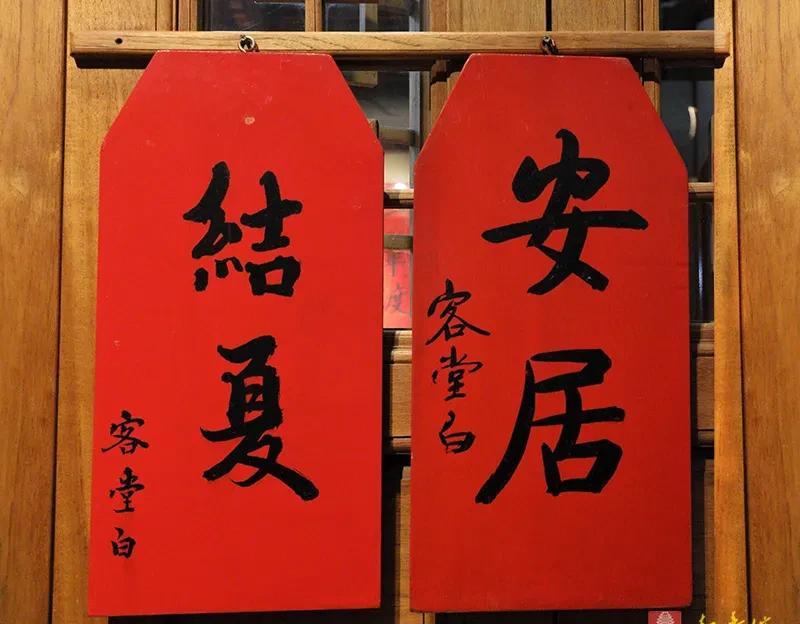
There are also summer residences, rain residences, summer sitting, summer sitting, summer sitting, ninety years of fasting, and knotting settlement. Everyone knows that Buddhism originated in India, and the origin of settling down was the Buddha's personal determination. During this period, monks are forbidden to go out and live together in one place to practice intensively, called an abiding dwelling.
The origin of settlement
The origin of anjue began in ancient Brahmanism in India and was later adopted by Buddhism. Due to its subtropical location, India's climate is hot and rainy, and the summer rainy season is as long as three months. Insects and ants multiply rapidly, grass and trees grow luxuriantly, and in order to avoid stepping on the new shoots of insect ants and grass and trees when they go out to entrust the bowl, which attracts ridicule from the world, they stipulate that they should avoid going out during the rainy season. In the Chang'ahan Sutra, volume 2, The Sutra of Travel, volume 39 of the Collected Sutras of the Buddha, and so on, the deeds of the Buddha and his disciples living in peace are recorded. The Sutras of the Sangha, etc., list the places where the Buddha sat in the summer during the forty-five years.
Settlement time - summer time: The first day of settlement is called the end of the summer; the day of successful completion is called the summer of the settlement
According to the Buddha's customized settlement system, the monastery will generally live from April 16 to July 15 as the period of settlement. Due to regional relations, although the Chinese housing system is inherited from India, it is not completely followed, but there are some variations. Goode depends on the actual conditions of the climate and customs! There are two types of settlements: the former settlement begins from May 16 to August 15, and the post-settlement begins from June 16 to September 15. The other is to say that the former settlement, the middle settlement, and the post-settlement are settled. The former settlement began on April 16, the middle settlement began from April 17 to May 15, and the post-settlement began on May 16.
Xie Xia, that is, the successful end of the settlement, this time, are three months after the settlement, the time mainly depends on when to start settling down!
The spread of the Chinese Buddhist settlement system
The Chinese system of living in peace began in the Yao Qin era, when due to the interpretation of the Ten Laws of Recitation, the Guang law, etc., all explained in detail the practice of living in peace, and Chinese monks followed it to form a summer. After the Fall of the Tang and Song Dynasties, the settlement system gradually became one of the rules of the Zen jungle dojo. In addition, the jungle monastery refers to the system of "knotting summer" and also conducts "winter settlement" from October 16 to the fifteenth day of the first month of the following year. In modern times, some monasteries and dojos have further implemented the "winter ginseng meditation" system of "knotting winter ginseng zen" and "knotting summer sermons".
Settlement Locations - General Rules of Settlement
There are not too many restrictions on where to live, and according to Buddhism today, ordinary monks are in the monasteries where they usually live, large or small. At the beginning of the settlement, the monasteries will carry out rituals such as sprinkling and purification, and the general procedures for settling down are: first, "receiving the Dharma", the procedures of which are: first, sprinkling and sweeping the seat; second, the morning fast pre-whitening; third, the bell ringing the monks; fourth, entering the church to honor the shooting; fifth, receiving the karma; and sixth, performing the number of whites. After the completion of the preparation, the next day the settlement officially began. During the settlement period, if the following circumstances occur, they can only be relocated, otherwise they will violate the precepts. That is, first, fire and burning; second, poisonous snake harassment; third, flooding; fourth, the land is not allowed; fifth, thieves; sixth, the harassment of relatives; seventh, there are female difficulties, etc.
The Etsusha Residence is one of the monks' practice system, and the monastery generally does not give hanging orders during the Echisha Residence! Exceptions apply in exceptional circumstances.